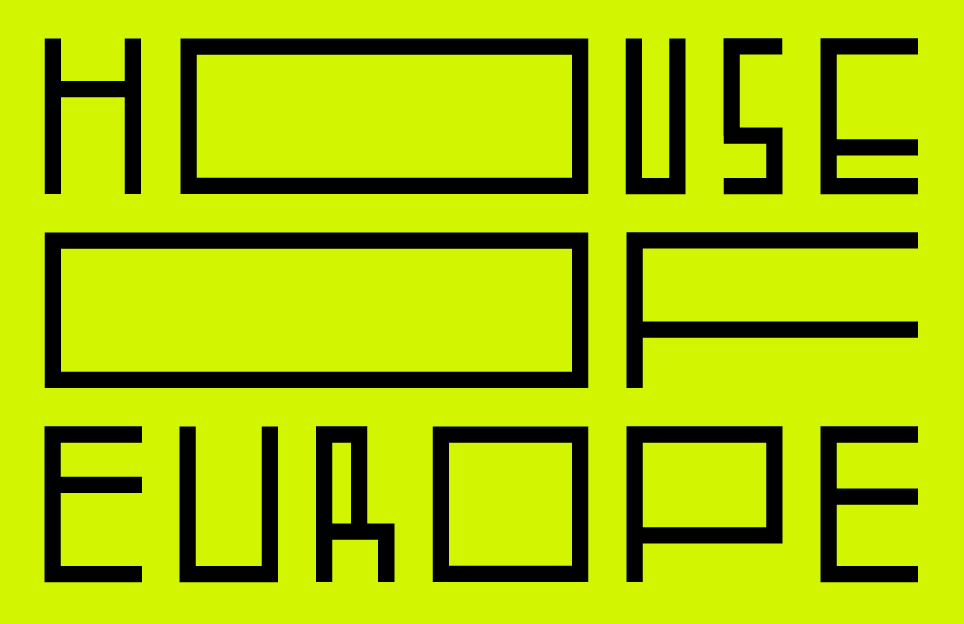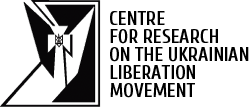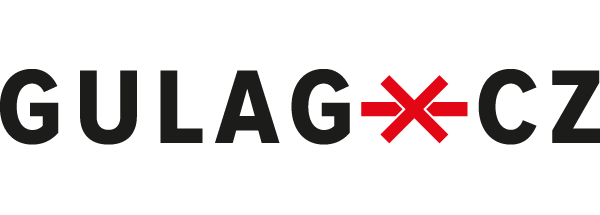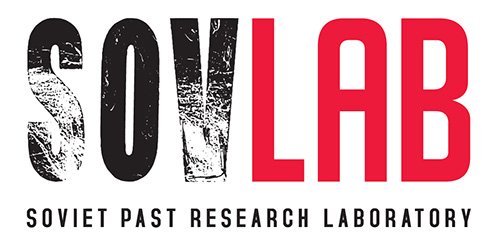
Oleksandr
Dovzhenko
film-director, writer, artist
1894
|
1956
Oleksandr Dovzhenko was born in village Sosnytsya in Chernihiv Region. He graduated from Glukhiv Training College and for a short period of time worked as a teacher teaching Math, Painting, Environmental Studies, Physics, Geography, History. According to the agents’ reports in 1919-1920 was taught by the artist Mykhailo Boychuk, “bourgeois nationalist” who was executed by shooting in 1937.
The first case of Oleksandr Dovzhenko (investigative case No. 112) appeared already in 1919 when he was arrested for service in Petlura’s army. With two of his mates Dovzhenko was sentenced to detention in a concentration camp till the end of the Civil War. But he was soon released thanks to the intermediacy of his friends Borotbists (Fighters). The original case was not preserved, though copies of few documents can be found in the later formulary file.
Consequently, for a long time he had to prove his loyalty. From 1921 to 1923 as a Secretary of the Representative office of the Ukrainian SSR abroad. One of the office’s non-official tasks was to popularize the image of the Soviet Union and conduct agitation to return the emigrants back.




Dovzhenko worked as a diplomat in Poland and Germany, though he was much more interested in the career of an artist. So having the permission of CC CP(b)U for almost a year he was learning graphic art in a private artistic school in Berlin. In Germany he got acquainted with an artist Mykola Hlushenko whose denunciations would eventually become part of the formulary file of Dovzhenko in 1934.

After the return to Ukraine in 1923 Dovzhenko was working as a graphic illustrator. But in two years he entered the world of cinematography which eventually became his career.




Although it was the time of seemingly relatively free artist life, from the middle of 1920s Dovzhenko is under thorough surveillance as object “Zaporozhets”. “Compromising files” against Dovzhenko were sent by the chekists from city to city, following Dovzhenko from Kharkiv to Odesa, from Odesa to Kyiv, from Kyiv to Moscow.

In the period from 1925 to 1930 Dovzhenko shot five films: “Vasya the Reformer”, “ The Diplomatic Pouch”, trilogy “Zvenigora”, “Arsenal” and “Earth”. Films had impressive success and Dovzhenko didn’t try to cut the expenses. In 1929 agent “Khimik” (“Chemist”) complained on the high budgets of Dovzhenko, “criminally” expensive decorations and “spoiling” of the film stock for several takes of one scene. The same year agent “Sviy” (“Friend”) reports about the “scandal” at the film studio as Dovzhenko refused to film in the decorations that were already prepared and claimed expedition to Sukhumi.
Film “Earth” was released in 1930 just at the time of political witch hunt when Ukrainian artists suddenly turned into “bourgeois nationalists”.
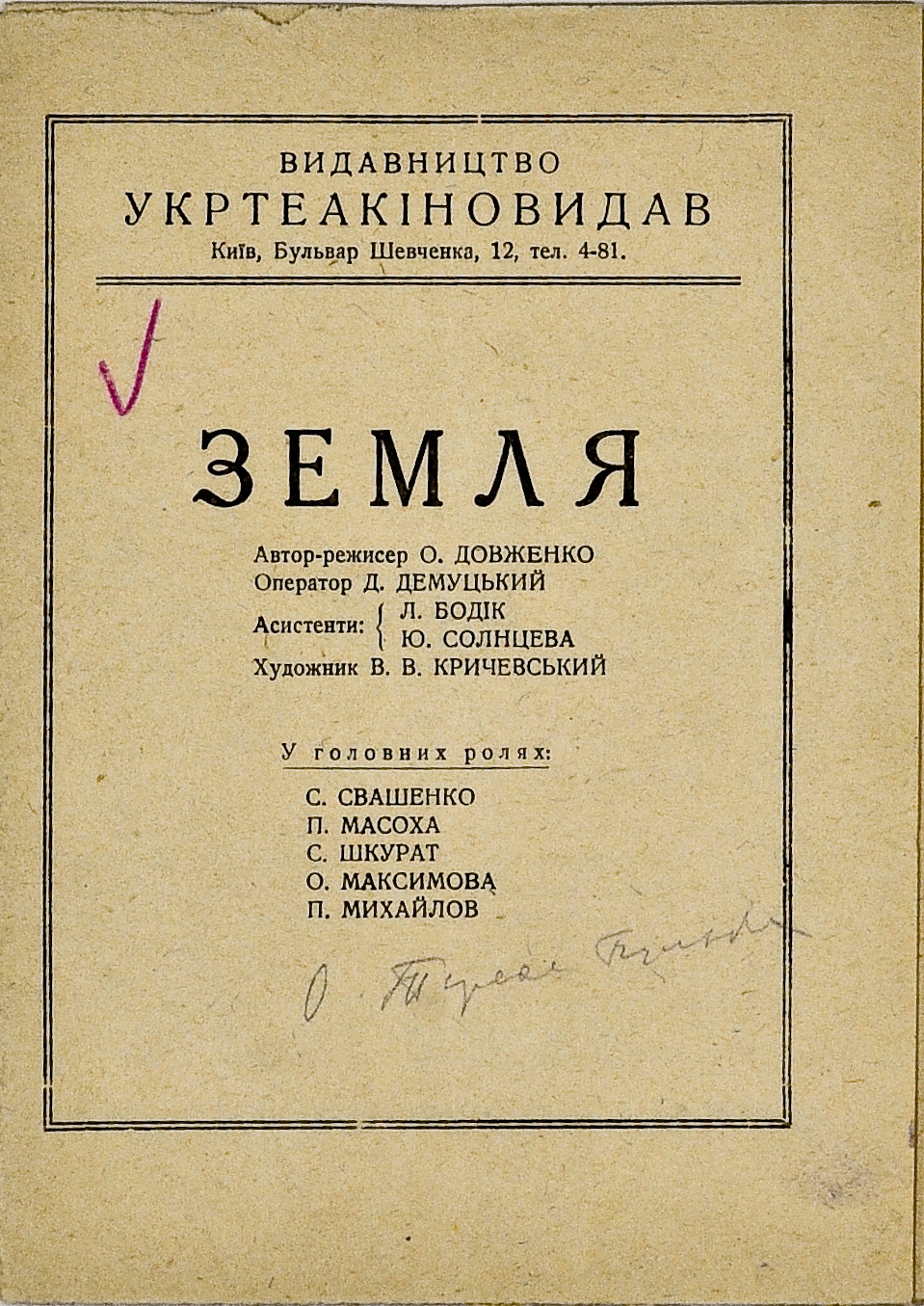
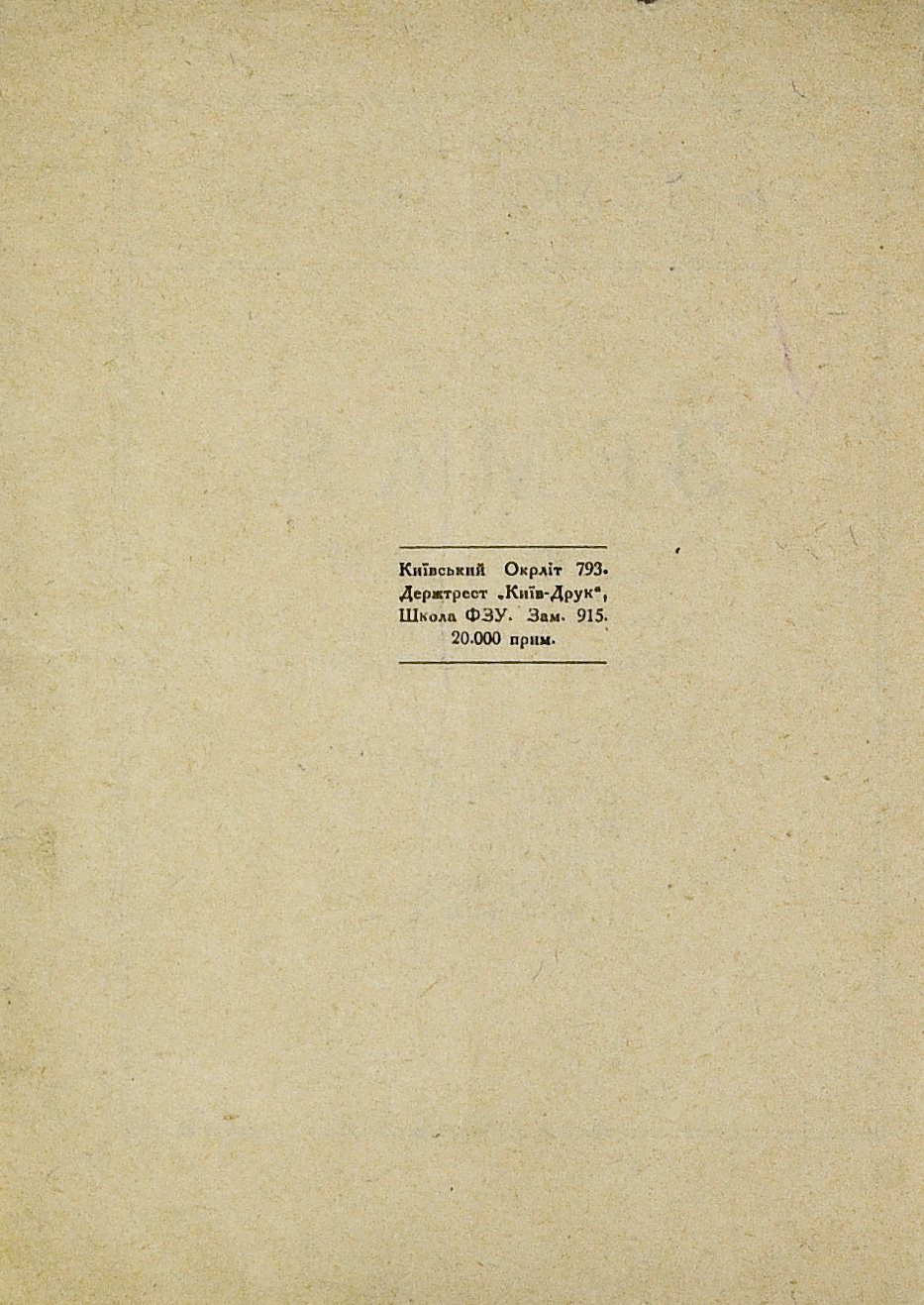
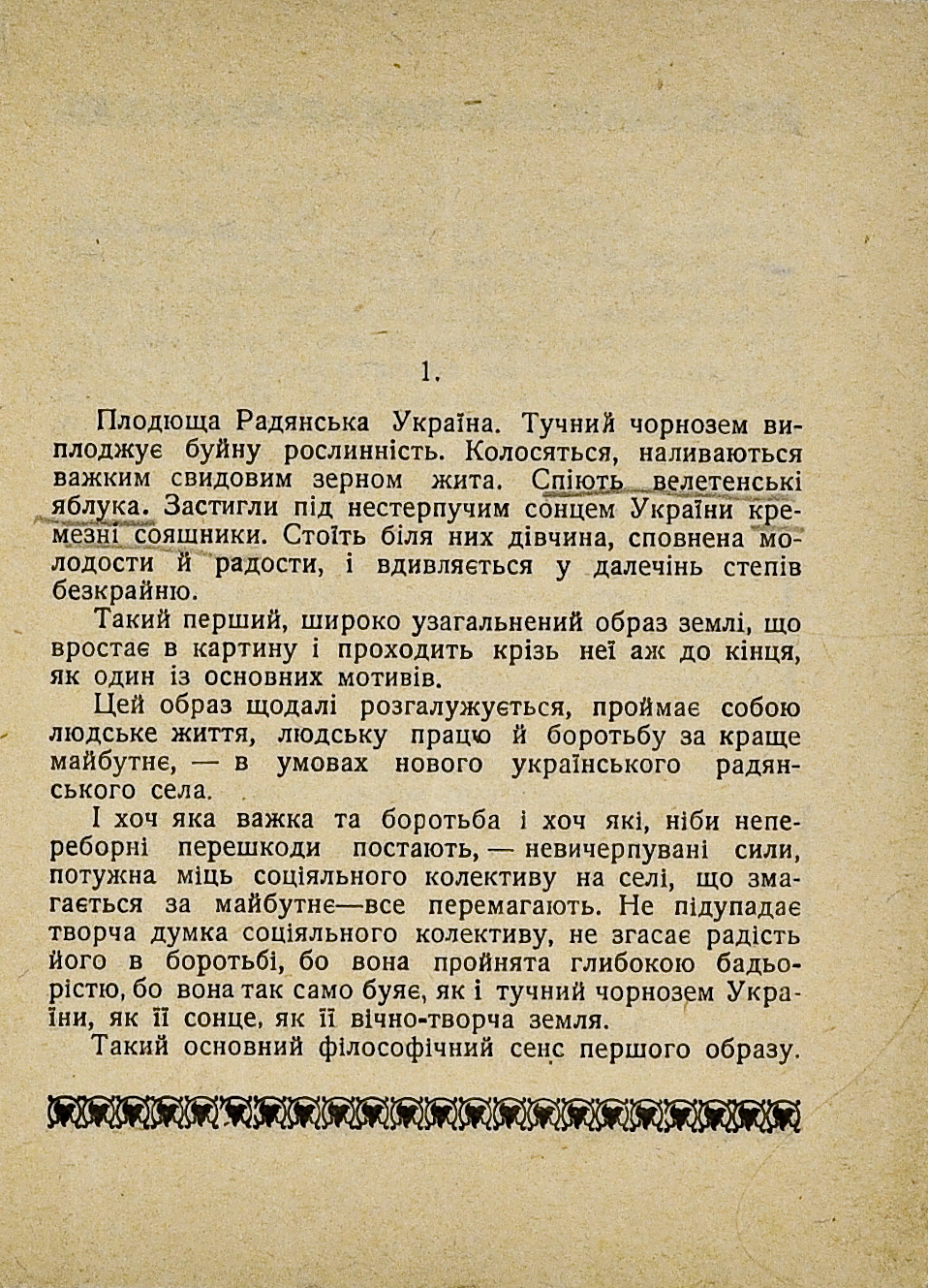

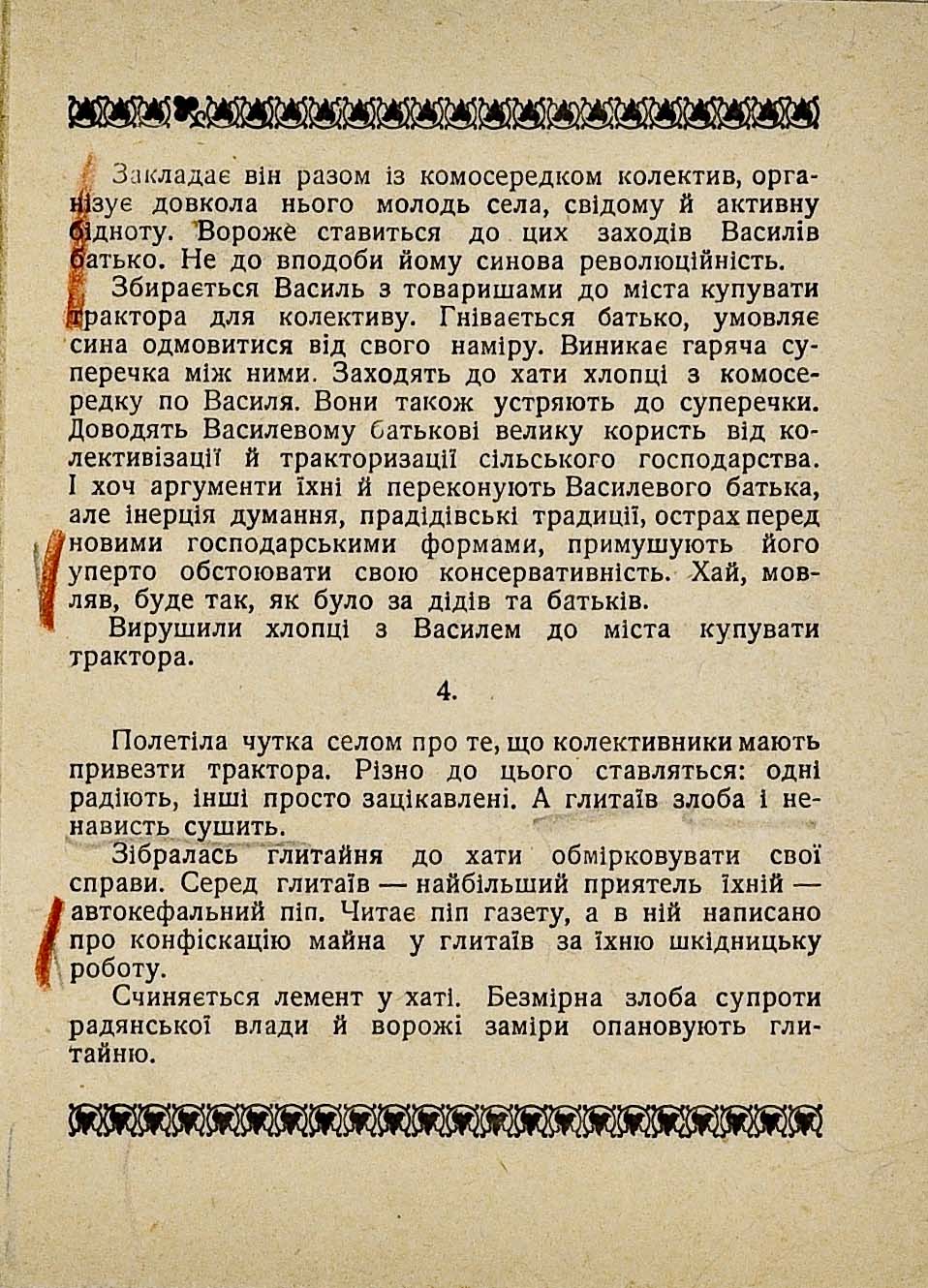
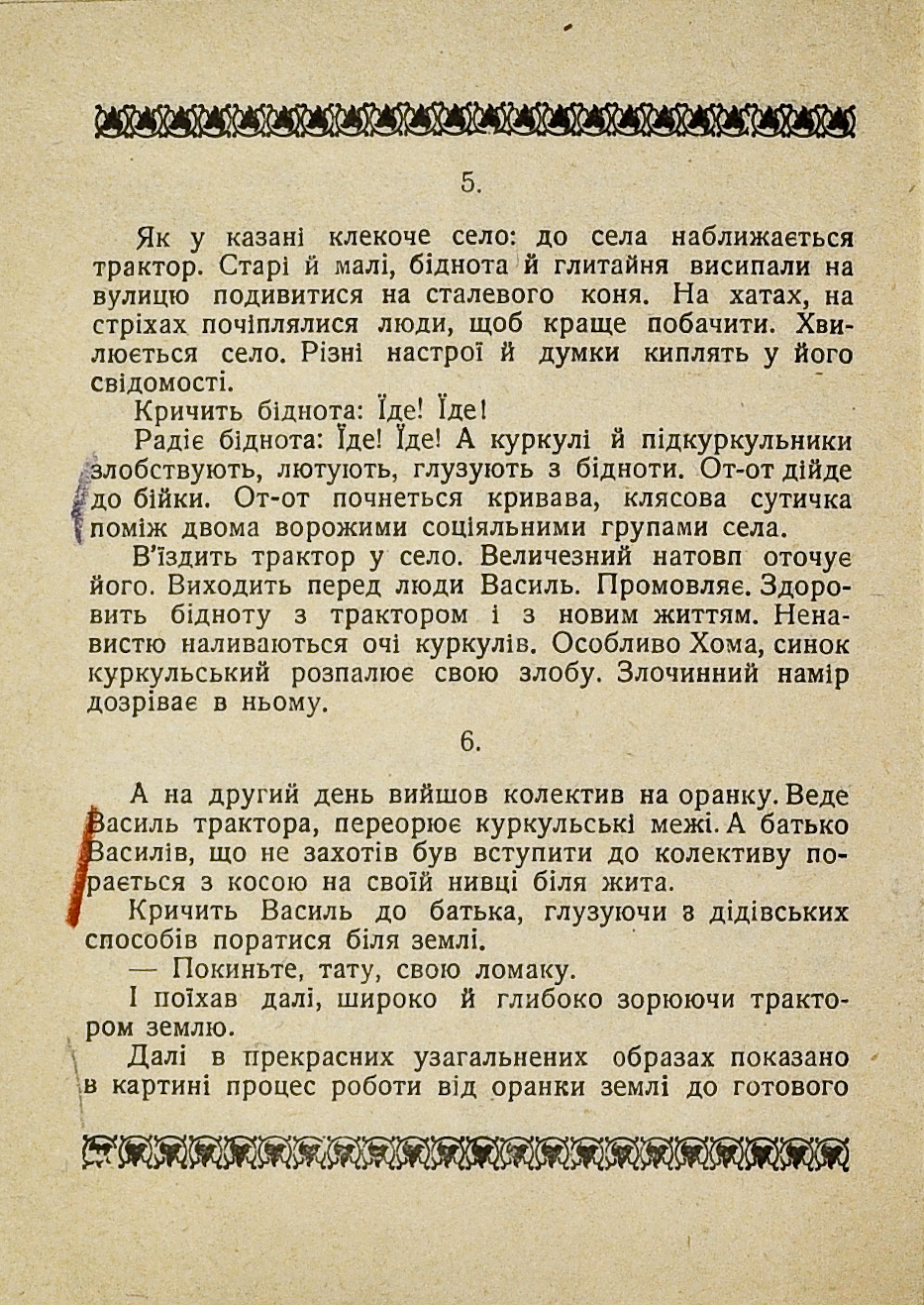
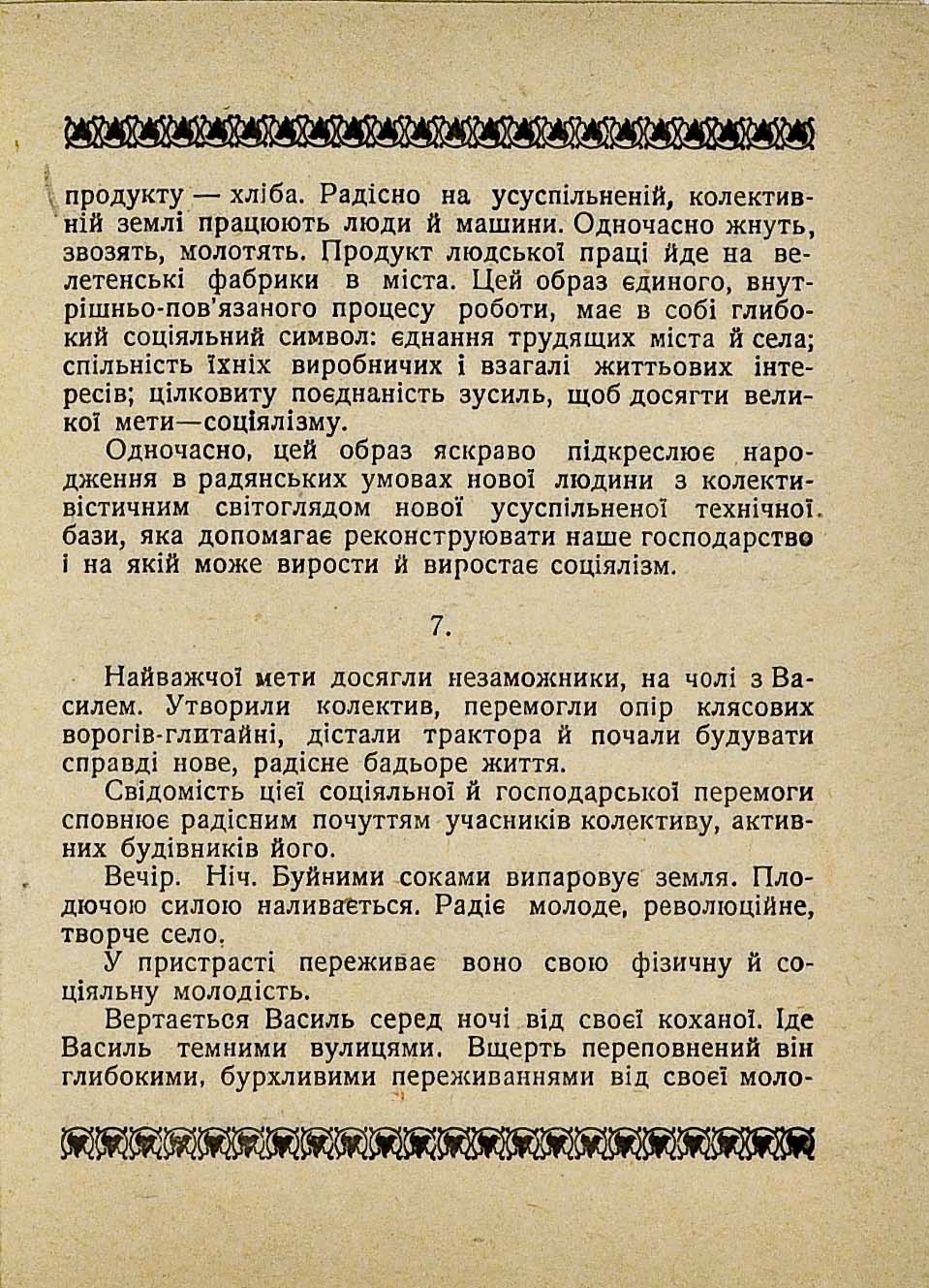
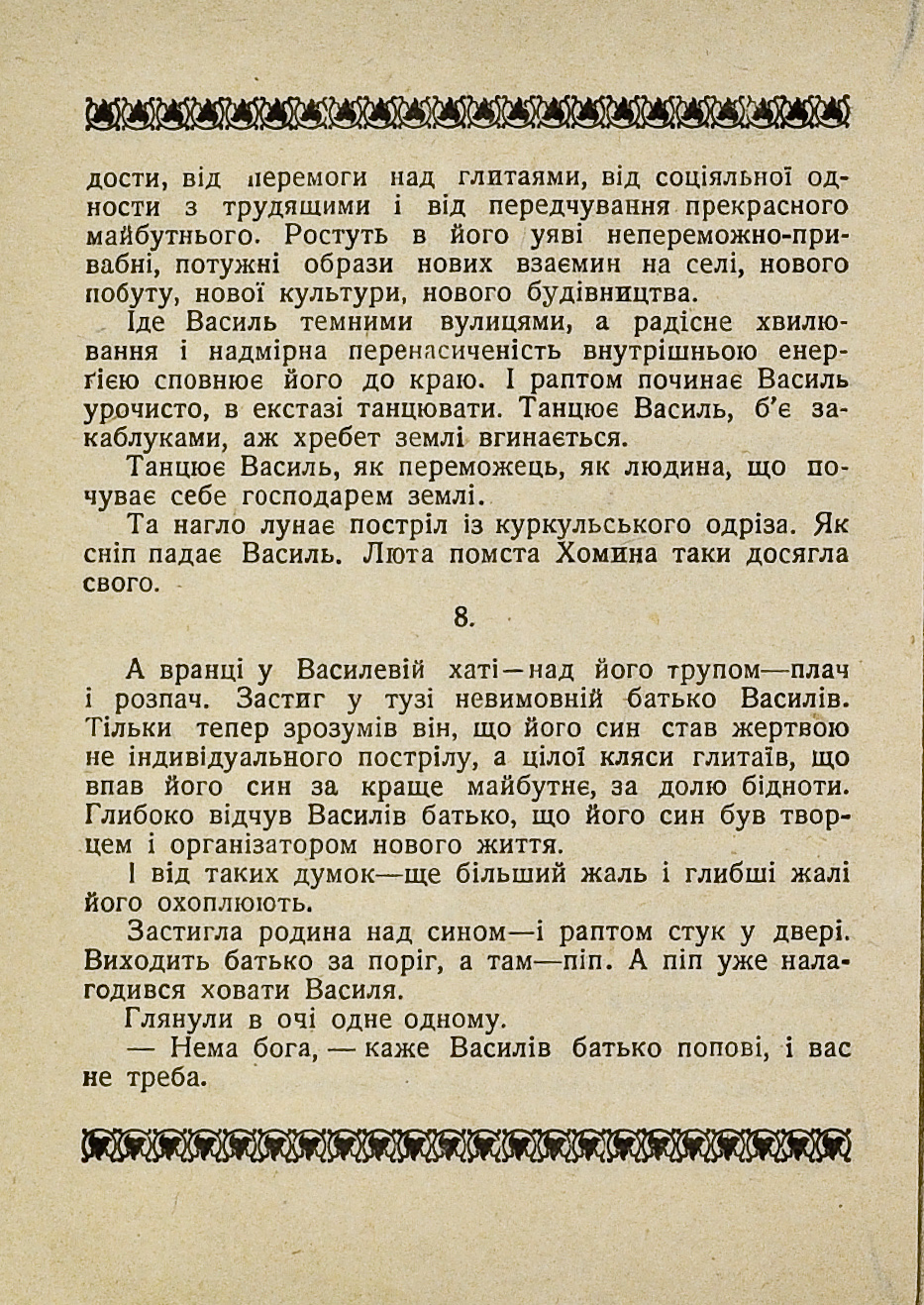
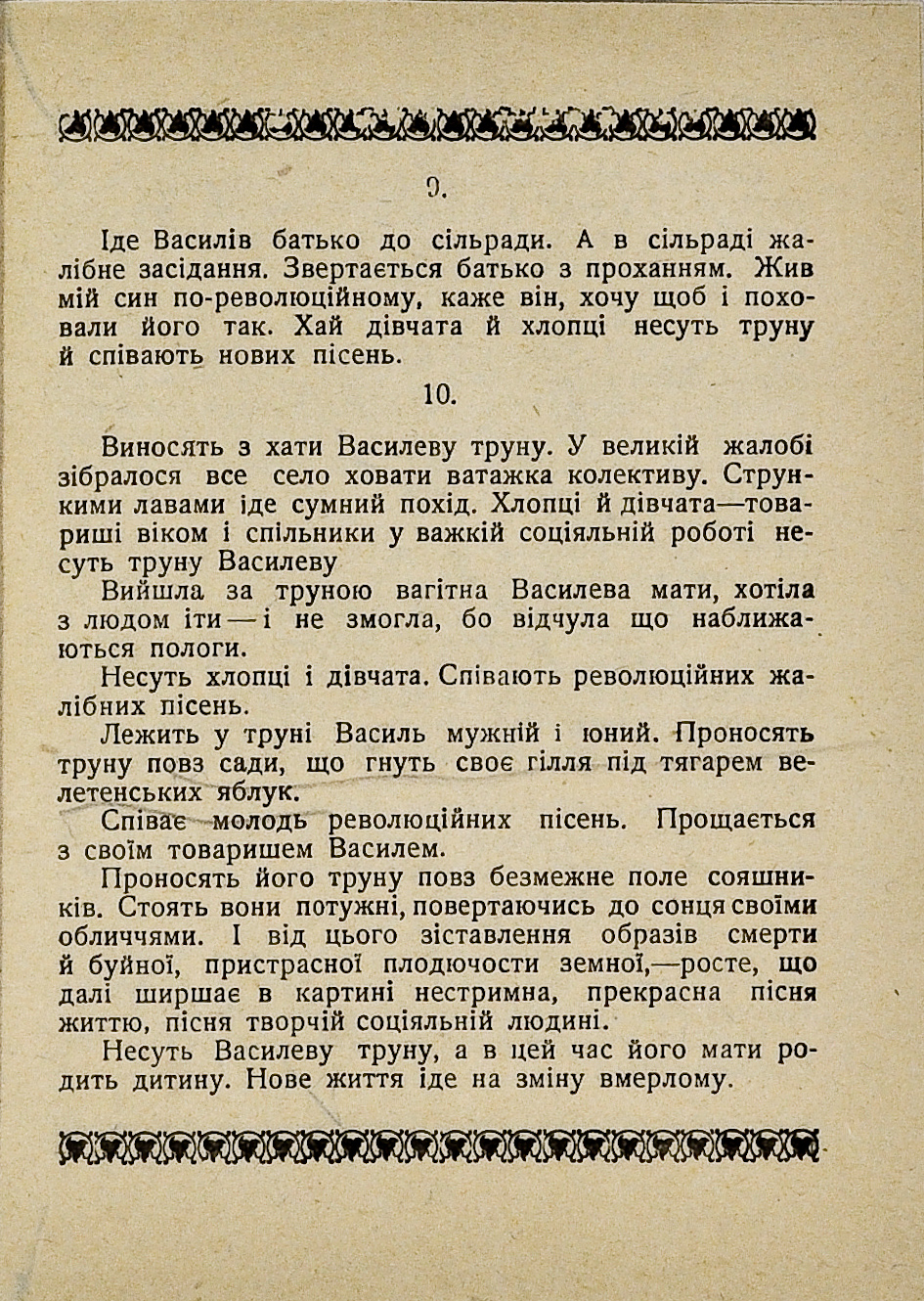
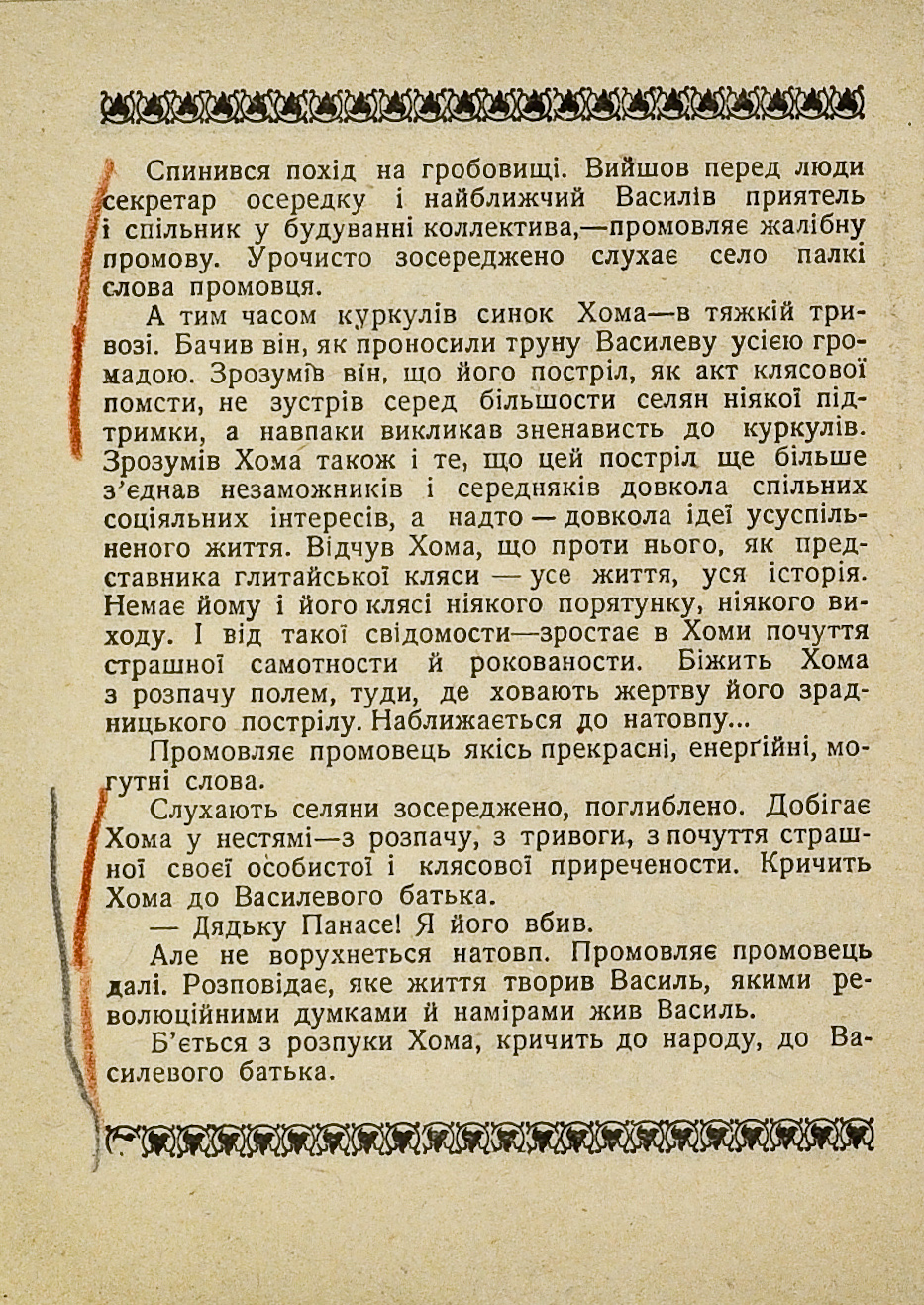
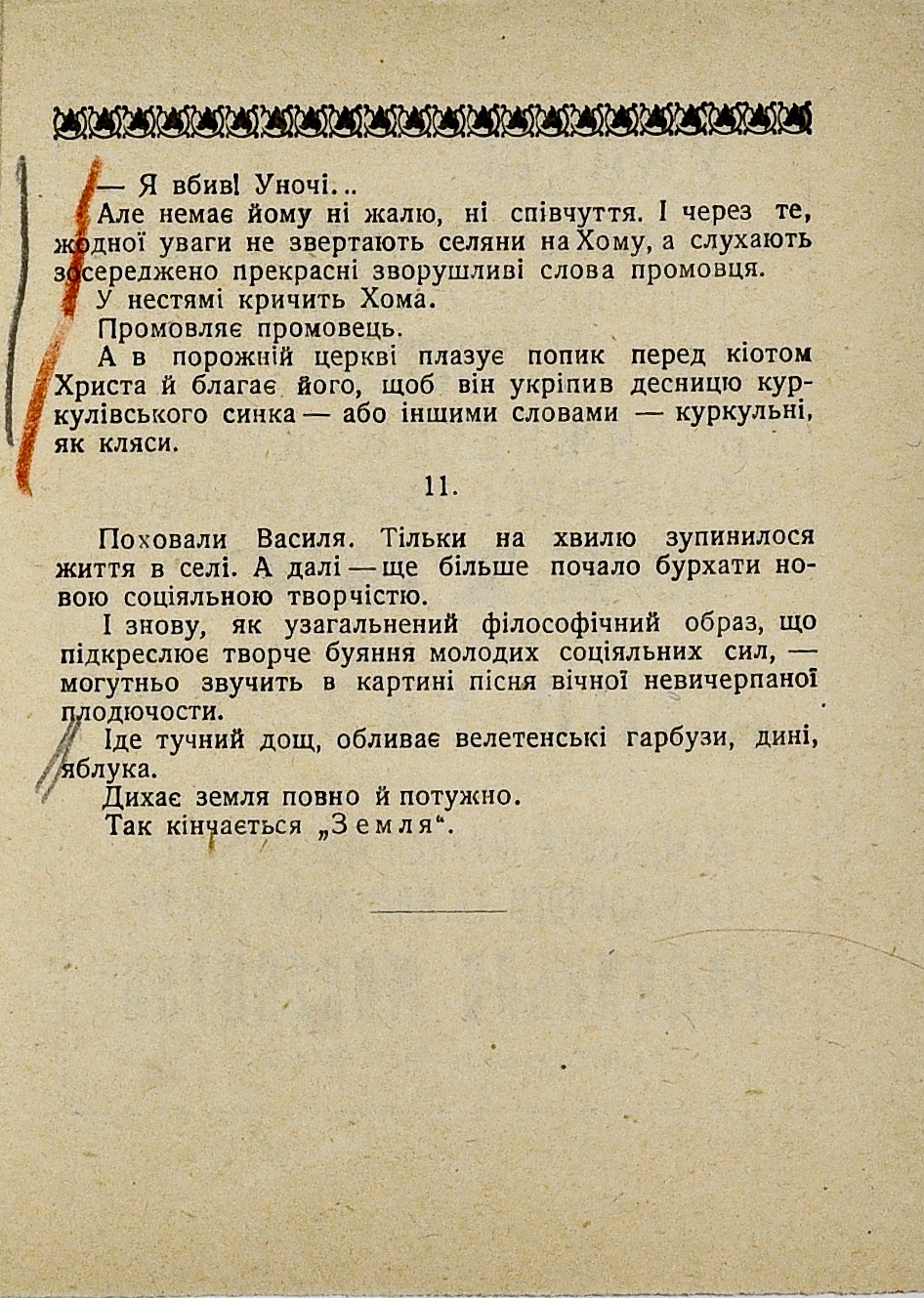
Although the opponents of the collectivization in Dovzhenko’s film are depicted as supposedely retarded behind the progress, the director is accused of sympathy to the villagers who face difficulties during the adaptation to the Soviet life. In a few days the film was withdrawn from the distribution.

And the same year Dovzhenko was allowed to travel abroad where European cinemas were screening his movies. He hoped that the critics was temporal and from Berlin he even sends a letter to Ivan Vorobiov, Chairman of the Board of All-Ukrainian Photo Cinema Administration requesting permission to travel to the US. He explained the need of the trip to “first see this country, and second it is America where one can find some useful experience and bring it to the Ukrainian SSR”.
Chekists refused to give the permission being afraid that the author of a “counter-revolutionary nationalistic film “Earth” wouldn’t return from the US.


This period was quite difficult for Dovzhenko as a film director. He was working on his next film “Ivan” about the building of Dnieper Hydroelectric Station but foresees the critics. Agent “Kholmsky” reported that Dovzhenko is in a desperate mood as he wanted to escape to the world’s end after the film “Ivan”, to go to Murmansk sea and prepare a screenplay about Arctics or film a military movie in China.
While working on “Ivan” Dovzhenko was sent on a business trip to the Caucasus. But according to the agent’s reports he returned upset and no material filmed and also with “outrageous” anecdotes about comrade Stalin. Chekist lined them through with a pen and added comments that he blotted out the text due to “libel against the party”. Through the ink it is still readable: “In certain circles Dovchenko told that he heard the following rumors from the party members in Tbilisi: a) Stalin is faggot; b) Stalin’s mother is a prostitute; c) when Stalin came to Tbilisi he called his mother as a whore and sent her away”.

The agents reported: Dovzhenko hated Stalin. Dovzhenko who filmed movies about the changes of life of the villagers and industrialization, knows about the beginning of Holodomor and openly speaks about what he would like to film:
“I would film such a movie that would force the world to shudder with horror. I would show one hundred fifty million of hungry people [...] and I would show a bunch of sated stupid maniacs [...] who have enjoyed their fill in closed cafeterias preaching socialism to the hungry people and telling nonsences about the success in construction. And I would show them citizens of Kyiv who read the articles about the newly opened Dnipro power plant with the light of oil and kerosene stoves”.

In less than two years Dovzhenko’s rhetoric would change radically as Stalin would grant him life. But before that he would face devastating critics and bullying for the film “Ivan” released in 1932. Lengthy review points that “definitely adversarial” film, “mosaic of dubious Aesop’s charades” evokes “indifference, boredom”, sometimes “nuisance and disillusion”, construction is shown as “chaos and mayhem” and the villagers participate not because of their interest in the “socialistic industry” but through the enforcement.
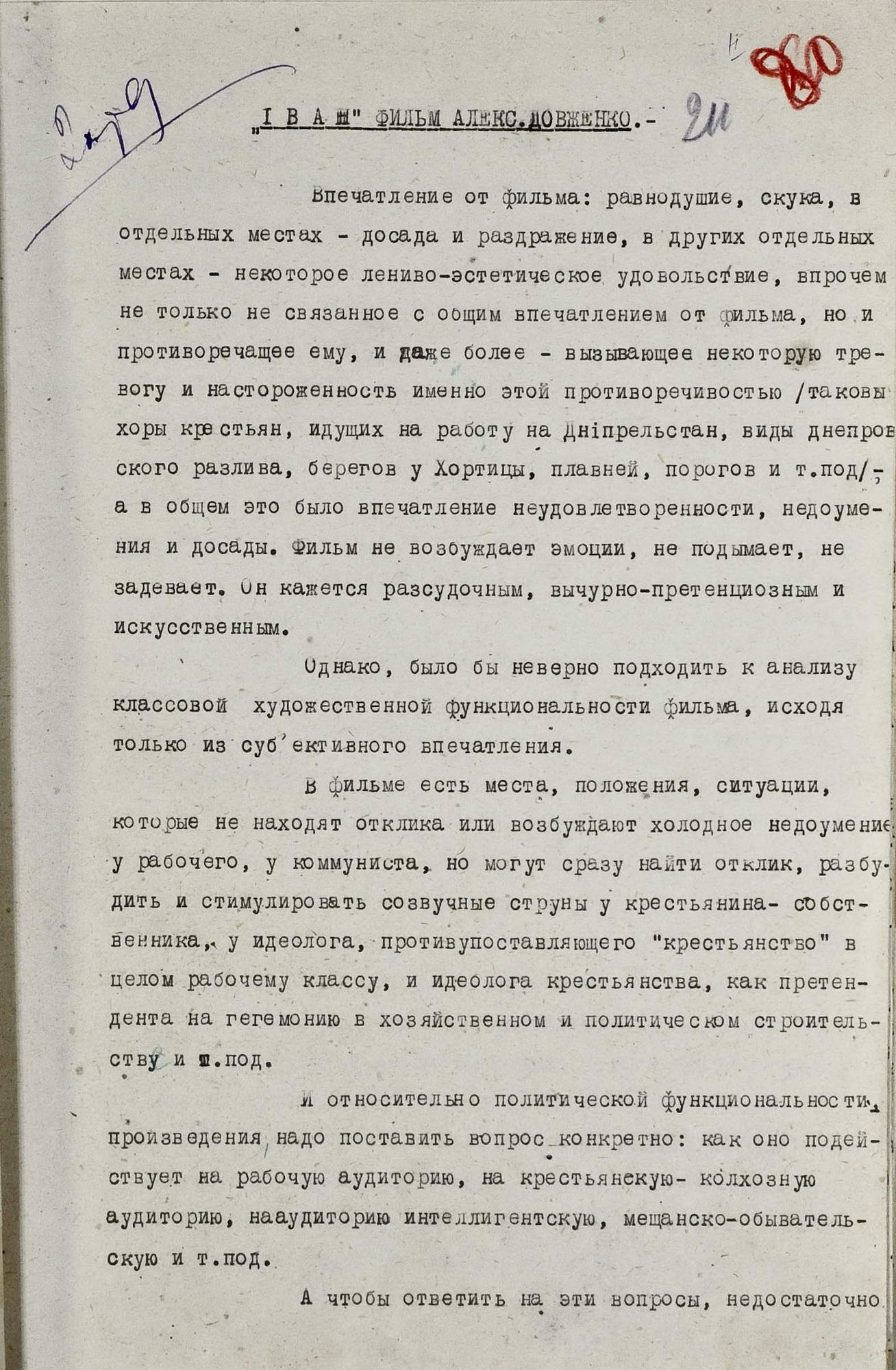



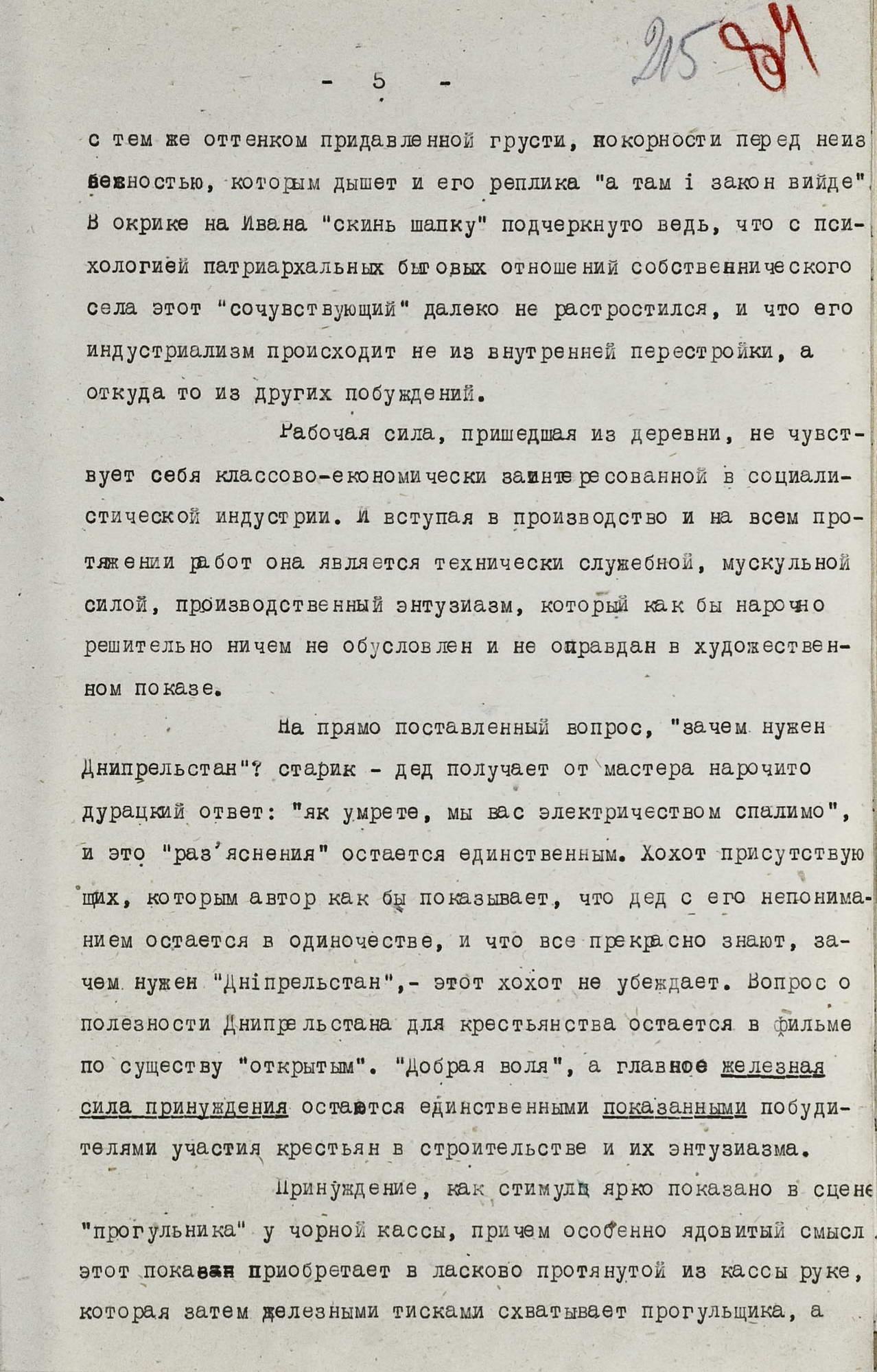
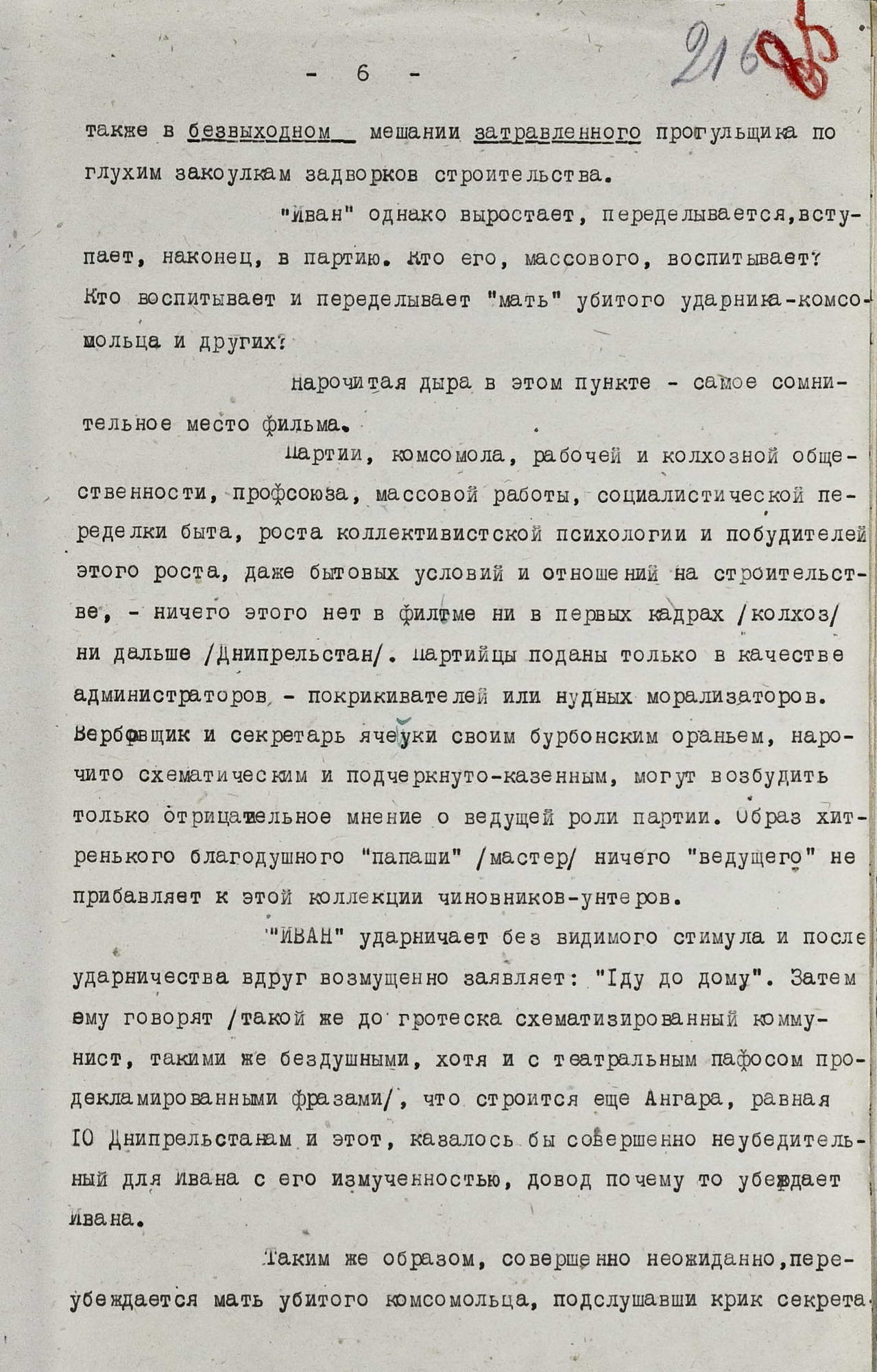

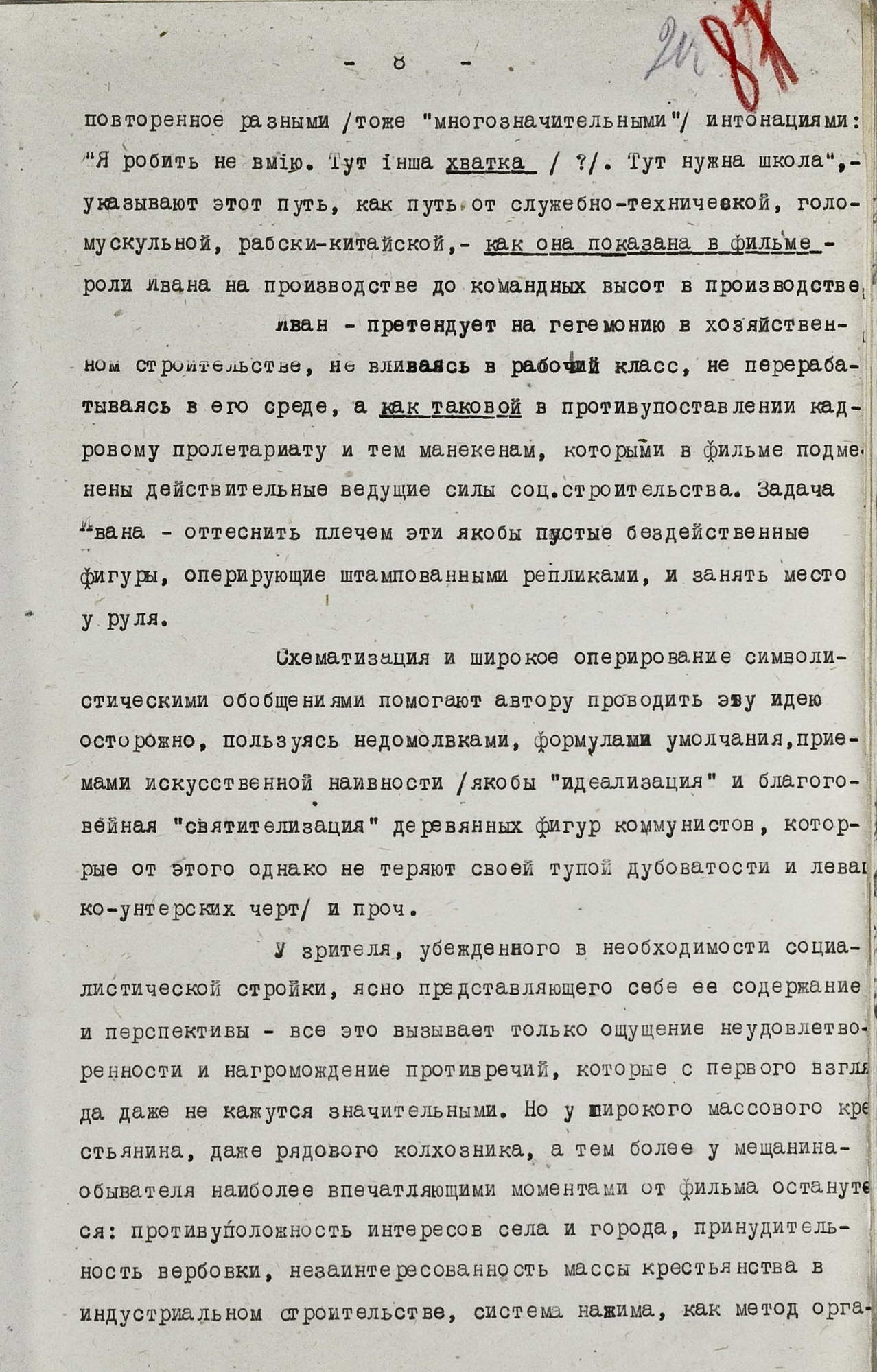
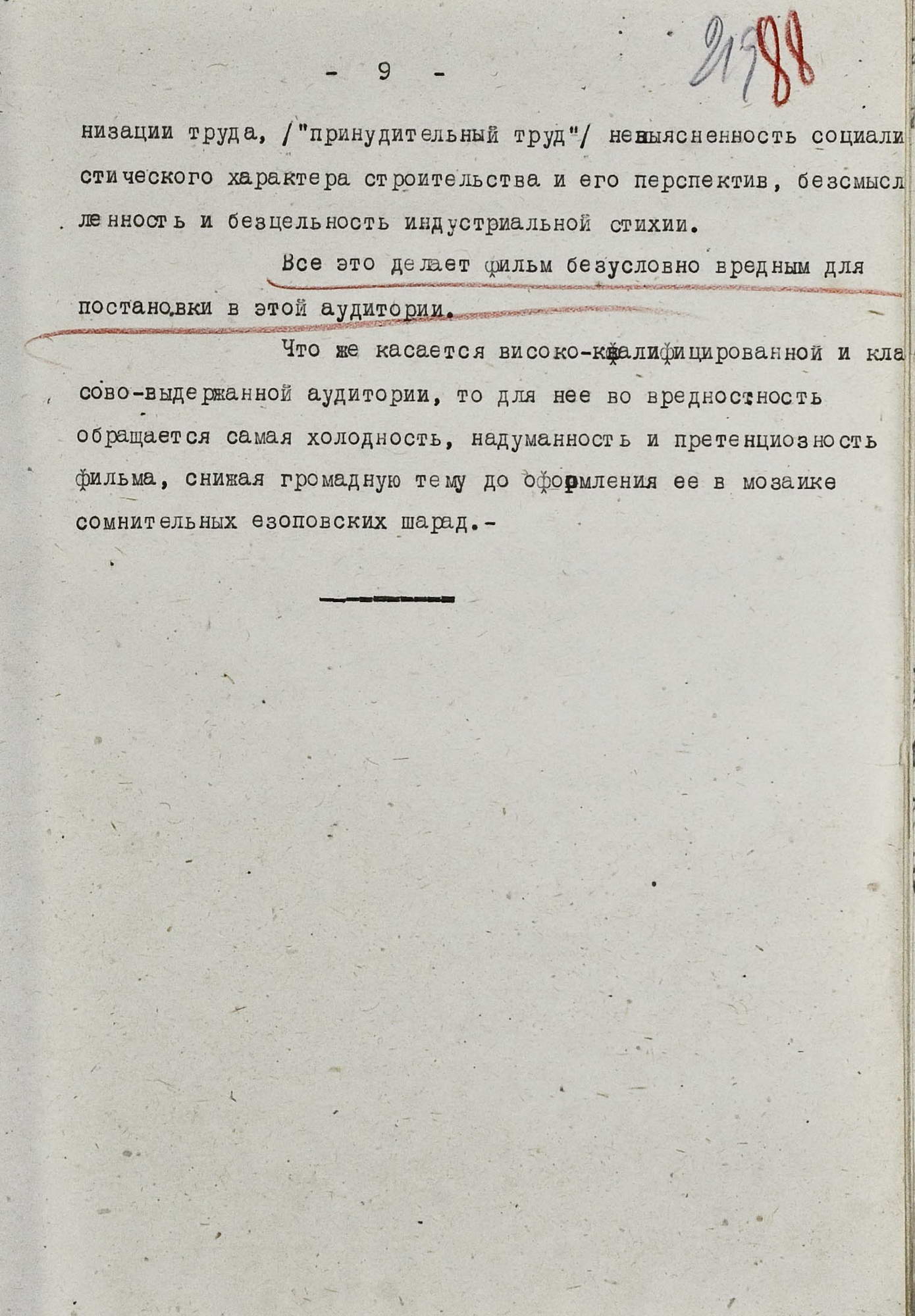
“Juxtaposition of nude, half-nude, exhausted and scratched figures at the construction with self asserting, “forceful” and sometimes well-nourished and decently dressed figures of the leadership, both regular workers and communists fully correspond those ideas that are cultivated in village by the Kulaks’ propaganda”, the same review stated. In general the film shows Soviet violence in the village.
This is the dialogue from the film between the grandfather-village and the communist:
— Why do we need the Dnieper Hydroelectric Station?
— When you die we will burn you with electricity.
The reviewer complained that instead of the class issues Dovzhenko talked about the issue of the generations. But it would be “correctly” to show that everyone who was against were the Kulaks. Also the reviewers didn’t like satire against the bureaucracy: old mother has to open 12 doors before she gets to the higher management. They conclude that “creative approach of Dovzhenko is a Ukrainian counter-revolutional national-democratic movement” (0075)

In 1934 Dovzhenko and his wife fled to Moscow from probable arrest. There they find Stalin’s patronage who ordered two movies “Aerograd” and “Schors”. However even this couldn’t bring calm to Dovzhenko as the сhekists continued collecting agent’s data to be ready to immediately react in case the mood of Stalin changes.
Not only the surveillance of chekists but the reality of life in the Soviet Union in the 1930s itself imposed barriers. For example he had to refilm a few scenes from “Schors” because the prototype of one of the characters in real life was arrested and executed by shooting. Agent “Alekseev” reported that Dovczhenko was angry as he was waiting for the sun for nine days in order to film a mass scene and the next day it appeared that Shchors’ deputy Ivan Dubovy, who was leading the army according to the screenplay, was arrested. Dovzhenko had to film again all the scenes that contained name of Dubovy. Eventually Dubovy was executed by shooting. Total amount of time to film “Schors” took several years which was not typical for Dovzhenko.


For the film “Aerograd” Dovzhenko wanted to invite Khattori Sandji but the Soviet government was actively recruiting him as a spy and they didn’t want to display him. Sandji was also eventually arrested and killed.
There was a real swarm of agents around Dovzhenko. Often his nearest people became agents against their own will. For example his friend Mykola Bazhan (agent “Petro Umansky”). First time he reported about Dovzhenko in 1937 when a lot of their colleagues were either executed or sent to camps. Even during the times of hard public criticism of Dovzhenko, Bazhan in his reports insisted that everything Dovzhenko was filming coincided with the party line and the politics of Stalin.


Moreover, when Bazhan became an agent he tried to distance from Dovzhenko and hinted him to be careful while talking to friends. But Dovzhenko did not understand that. Yuriy Smolych, agent “Strila” in his report said: “Dovzhenko complains that Bazhan “spoilt” after he entered the party. “Spoilt” meaning he became “narrowly orthodoxal”, avoids sincerity, became colder, closed and rarely visits Dovzhenko. Dovzhenko supposes that the reason is not only the influence of the new wife but also of the party: “Mykola very primitively understood his party duties, I didn’t expect that from him”.
At the same time, despite the popular version that even his wife Yulia Sontseva reported against Dovzhenko under the code name “Leleko” (“Stork”), the archival file has no direct proof. And this version is based on the following report contained in the file:
“In the conversation the wife of the film director Dovzhenko Yulia Sontseva told that Dovzhenko is experiencing deep inner drama and that he concedes to the possibility of giving up his work in Ukrainefilm studio.
When I asked about the reason, she asked me to tell no one and strictly keep it a secret and told the following: “Already a long time ago Dovzhenko wrote the screenplay of the movie “Ivan” with the central topic of high-powered work [... further is the story about the problems with the movie]”.
Dovzhenko and Solntseva regretted returning to Russia that soon. She says they should stay abroad longer till this cinematic mess passes by. At the end of our conversation she said “Eisenstein did the right thing. He just left and is not planning to return anytime soon”.

Below there is a note “secret agent “Leleko”” lined through and near surname “Solntseva”. It is unlikely because if Solntseva had been an agent she wouldn’t have decided to complain to chekists that she wanted to go abroad and asked to keep it a secret. Probably this means that the report is based on the conversation with Solntseva.
However Yulia Solntseva really had good connections and she used it to protect Dovzhenko. Due to her they could be safe in Moscow in the 1930s. She warned her husband when it was better to keep his mouth shut. For good reason she supposed that friends and colleagues are agents so she tried to limit his communication. The agents in their turn complained in the reports on her malign character and “non-proletary origin” because her mother was “typical lady of the manor”.
The agents were everywhere: starting with his personal driver who reported the conversations in the car to the colleagues at the film studio. Files abound with code names: “Khimik” (“Chemist”), “Zhurnalist” (“Journalist”), “Antenna”, “Kinematohrafist” (“Cinematographer”), “Kholmsky”, “Petrov”, “Stella”, “Fiodorov”, “Sviy” (“Friend”), “Alekseev”, “Stalnoy” (“Steel”), “Polyarny” (“Polar”), “Actor”, “Filonov”, “Petro Umansky”, “Khudoznyk” (“Painter”), “Andreyev”, “Patriot”, “Virny” (“Devoted”), “Viktorov”, “Kotin”, “Kucheryavy” (“Curly”), “Chorny” (“Black”), “Samoilov”, “Grinvald”, “Pavlova”, “Albert”, “Pavlenko”, “Tymofeev”, driver “Alelsin”, “Hryhory”, “Sorbonin”, “Borys”, “Malov”, “Valery”, “Filosof” (“Philosopher”), “Mogylevsky” and the list goes on.
They recorded all the uncareful phrases of Dovzhenko: how he strived for the movies to be filmed in Ukrainian at Kyiv film studio and only then dubbed with Russian and other languages, how he criticized staffing policy in art field and said that Jews and Russians were appointed for the key positions and they knew nothing about the Ukrainian culture. In one of his reports Yuriy Smolych comments Dovzhenko’s objections against non-Ukrainians at the key positions in Ukraine: “Psychic setup of Dovzhenko unexpectedly combines clarity of thinking, love of freedom, tolerance, education with the stupidity of a dark retarded villager, for example with anti-semitism”.
Agent “Strila” (“Arrow”) - Smolych wrote about their meeting: “In a raised voice Dovzhenko started the conversation with the following: “why in Georgia Georgians make movies, in Russia Russians, but in Ukraine Georgians, Russians, Jews but not Ukrainians”
In the end of 1930s Dovzhenko returned to Ukraine to film a movie about Soviet occupation of the Western Ukraine named “Liberation”. He didn’t like the “reunion” process. In his reports Smolych narrated their dialogue:
— For the month and a half I’ve seen only one agitator who used the arguments of the rough truth and not with the cheap lies.
— And who was it?
— Me.

Eventually “Liberation”, released in 1940, was seen as ideologically mistaken and soon the film was removed from cinemas.
During the Second World War Kyiv film studio was evacuated to Ashkhabad and in the reports of those times object “Zaporozhets” was renamed to “Kiyevlyanin”. During the war Dovzhenko voluntarily worked as a front newspaper journalist. There he spoke about the low combat capacity of the Red Army in comparison with the German army. He also made efforts to take Ukrainian painters from the frontline by applying to Khrushov. After failing he told that Khrushov just had a lack of taste.
At that period Dovzhenko wrote a screenplay to “Ukraine in Flames” and that would be the reason to fall into disfavour for a long time again. The film was criticized by Stalin himself so nobody had the heart to openly make a stand for the director.
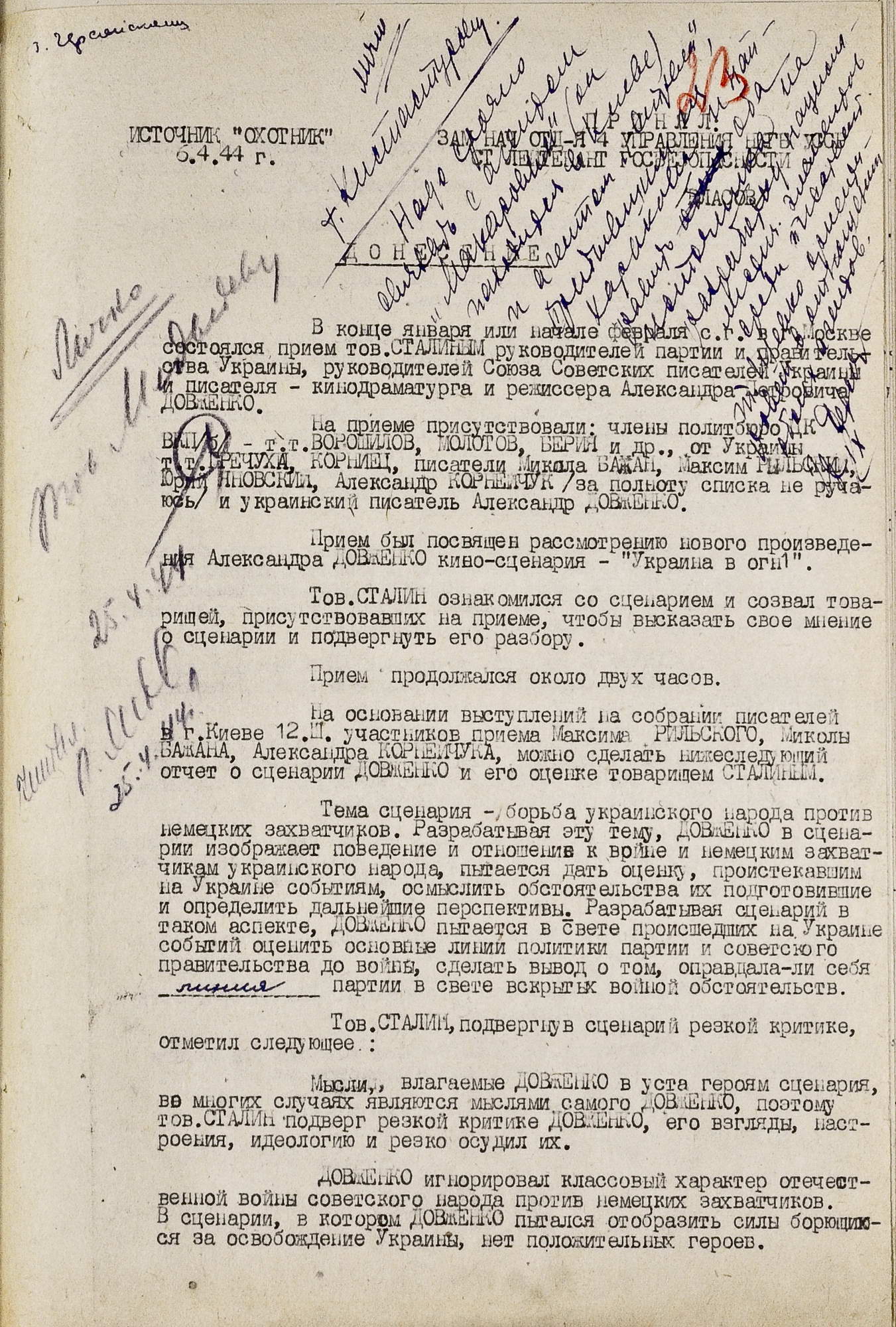
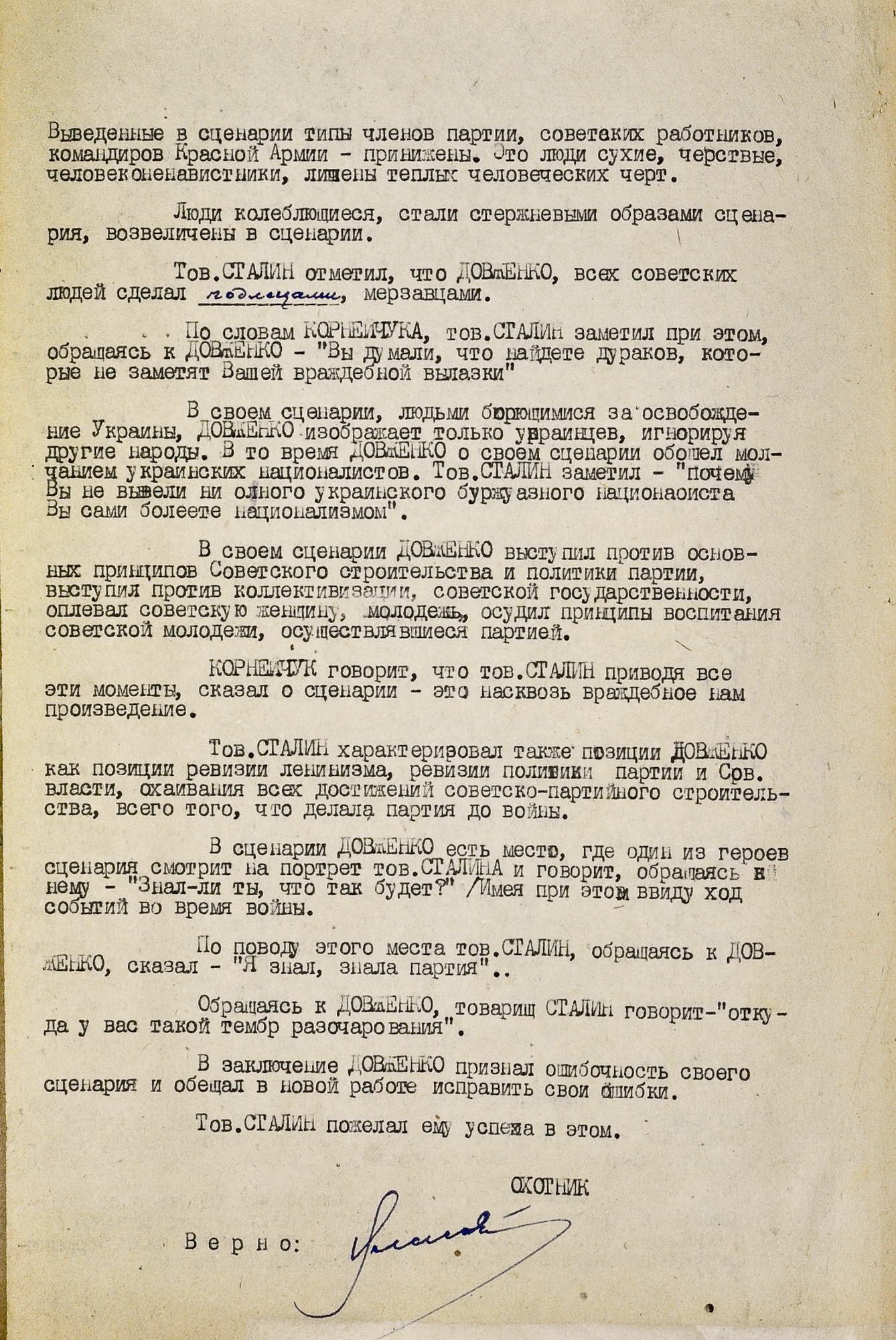
“Addressing to Dovzhenko comrade Stalin asks “from where do you have this tone of disillusion?””
Agent “Okhotnik” (“Hunter”) messaged: “This is what comrade Stalin told: “This is a fully adverse movie”.
“There is a really miraculous scene in Dovzhenko’s movie. Before the Germans entered, a Ukrainian girl made a bed and invited a tank crew member who stayed in her house to lay with her, because anyway the Germans will come so it would be better to lose virginity with Soviet soldier and not with the Germans. Comrade Stalin criticized this scene as slander against Soviet woman”.
In March 1945 Dovzheko complained about his nasty nervous state: “My nerves are strained to the maximum. It seems like my bones are uncovered, the skin peeled off due all the emotional shocks of the last year”.

In post-war years he suffered from the culture of “dovzhenko-chastising” as he named it himself. He wrote screenplays (for example, “Chronicle of Flaming Years”) but most of them remained only as plans because they were not approved, and the filming process always faced opposition. Dovzhenko only managed to film “Michurin” and documentary movie about Armenia.
Last years of his life Dovzhenko spent in Moscow. He complained about his health, from time to time faced new pieces of criticism and told that in Kyiv “on occasion they always kick Dovzhenko”
Dovzhenko died 25 November 1956 from a heart attack. He was buried in Moscow and in three years after bullying and bans was posthumously awarded with the Lenin Prize, one of the most prestigious prizes in the USSR.
In 1989 the case of Dovzhenko was reviewed by the KGB of the Ukrainian SSR. Major Polyansky and Lieutenant Colonel Podobny concluded that “it doesn’t contain any historical or operational value” and recommended destroying it. Relevant memorandum was sent for approval to the senior staff. Deputy head of 10th Department of the KGB of Ukrainian SSR was surprised with this decision to such an extent that he left some sarcastic comments straight on the documents: “come on!”, “chief operative is an idiot”, “what a fool”, “lieutenant-art critic”. His resolution stated to preserve the materials, all the actions should be approved by senior staff.

Archival formulary file of Oleksandr Dovzhenko in 4 volumes that also contains information about the life of artists at that time and relationship between the intellectuals, is stored in the Sectoral State Archive of the Security Service of Ukraine. Apparently documents regarding the last Moscow period of Dovzhenko's life remain in Russia.
Переглянути та завантажити документи зі справи Довженка можна на сайті Електронного архіву Українського визвольного руху.

